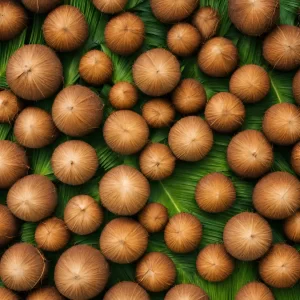The Green Revolution: Sustainable Uses of Coconut Husks
Coconut, the versatile fruit of the palm tree, not only provides us with nourishing water and delicious flesh but also offers sustainable solutions through its husks. In this blog post, we will explore the various innovative and eco-friendly uses of coconut husks from mature coconuts. Whether it is for personal or industrial purposes, these repurposed husks are playing a vital role in the green revolution.

Exploring the Untapped Potential of Coconut Husks
Coconut husks, often considered as waste, are now gaining recognition for their numerous uses beyond the traditional extraction of coir fibers. From horticulture to construction, these fibrous husks are providing sustainable alternatives to conventional materials. By embracing these eco-friendly solutions, we not only reduce waste but also contribute to the preservation of our environment.
1. Agriculture and Horticulture:
Coconut husks are widely used as a substrate for horticultural purposes. Fibrous and chemically inert, they provide an effective medium for plant growth. This material is commonly used in hydroponics and container gardening due to its excellent water retention and drainage properties. Derived from a renewable source, coconut husks reduce the carbon footprint as they replace synthetic alternatives.
Furthermore, coconut husk chips are utilized as a mulch for weed suppression, moisture retention, and temperature regulation in the soil. The natural fibers also act as a barrier against soil erosion, thus preserving the integrity of agricultural landscapes.
2. Biofuel Production:
As the world seeks sustainable energy sources, coconut husks are emerging as an excellent option for biofuel production. The carbon-rich composition of the husks makes them an ideal feedstock for biomass gasification and pyrolysis processes. By converting coconut husks into charcoal or bio-oil, we can generate renewable energy while reducing greenhouse gas emissions. This energy can be utilized for cooking, heating, or even electricity generation.
3. Eco-Friendly Crafts and Home Decor:
The versatility of coconut husks extends to the world of crafts and home decor. Artisans worldwide are transforming these raw materials into beautiful, sustainable products. From intricately woven baskets to creative wall hangings, coconut husks add a touch of natural elegance to any living space.
Additionally, coconut husk fibers can be molded and shaped for the production of biodegradable pots and planters. These eco-friendly containers not only promote sustainable gardening but also reduce plastic waste in nurseries and households.
4. Soil Amendment and Water Filtration:
The high lignin content in coconut husks makes them an excellent soil amendment. When mixed with compost or soil, the husks improve moisture retention, aeration, and nutrient availability. They also promote the growth of beneficial microorganisms and act as a pH buffer, creating optimal conditions for plant roots.
Furthermore, coconut husks can be used in water filtration systems. The natural fibers act as a filter medium, effectively removing impurities and sediments from water. This simple and eco-friendly filtration method provides clean drinking water in areas with limited access to potable water sources.
5. Sustainable Construction Materials:
Coconut husks are increasingly being incorporated into innovative construction materials. The fibrous nature of the husks makes them suitable for creating insulation boards, soundproof panels, and eco-friendly roofing tiles. These sustainable alternatives not only reduce energy consumption but also improve thermal insulation and acoustic performance in buildings.
Conclusion
Coconut husks, traditionally considered as waste, are now recognized for their incredible potential in promoting sustainability. From agriculture and biofuel production to crafts and construction, these repurposed husks offer eco-friendly alternatives to traditional materials. By embracing the green revolution and utilizing the sustainable uses of coconut husks, we can contribute to a healthier planet and a more sustainable future.
Join the coconut revolution today and harness the power of nature’s bounty!
For more information on mature coconuts and coconut byproducts, visit Thangamman Exports.
References:
– The Use of Coconut Fibers in Hydroponic Growing Systems
– Coconut husk as a potential bioenergy feedstock
– Coconut Coir for Soil Amendment
– Coconut Husks and Sustainable Building Materials
– Coconut Creative Crafts




